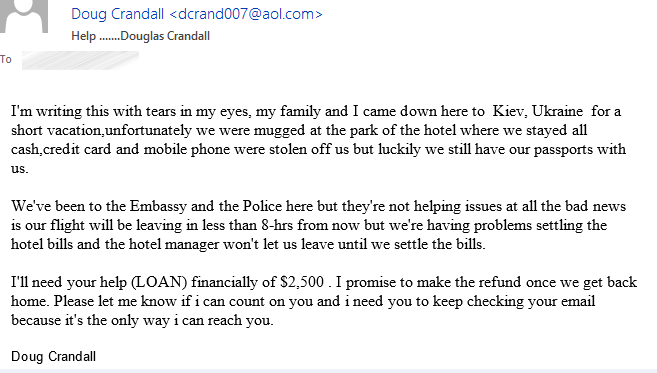Nigerian Scams Turn Ukrainian

Scammers are seeking victims from among the good-hearted with fake distress e-mail cries allegedly from vacationers who cannot leave Ukraine.
Amid the social and political strife in Ukraine, scammers have adjusted Nigerian scam scripts to hook kind-hearted strangers and have them send moderate sums of money to scammers’ accounts.
Bitdefender anti-spam labs spotted a trend in the messages: They claim to come from vacationers who lost their IDs and money somewhere in Kiev. The hotel manager won’t allow them to leave the country until they settle the accommodation fee. The senders ask for a “loan” of approximately $2,000 to pay the hotel bills.
Scammers ask people to send the money via Western Union as it allows people to withdraw money using only an ID or transaction number. The next step would be to use social engineering to have the victim reveal the transaction number for the deposit and steal the money. Once the evidence of the deposit is made, the money is gone and so is the alleged vacationer in distress.
A second trend is a spam wave promoting a dating portal where e-mails lure users with the idea of dating beautiful girls from Ukraine and Russia who are allegedly looking for serious relationships.
These spam samples reveal a disturbing cycle of spammers and scammers seeking to profit from humanitarians concerned with international social realities. The increasingly rapid adaptation of spam to ongoing current events comes as spammers develops new ways to sneak into people’s inboxes.
When you receive unsolicited e-mails in your inbox, don’t open them. And, make sure no one takes advantage of a good heart and don’t send money to people you don’t know just because of a sad story via e-mail.
A reliable antivirus and updated software makes all the difference in such cases in shielding users from all kinds of online attacks.
This article is based on the spam samples provided courtesy of Adrian MIRON, Bitdefender Spam Researcher.
All product and company names mentioned herein are for identification purposes only and are the property of, and may be trademarks of, their respective owners.
tags
Author
A blend of product manager and journalist with a pinch of e-threat analysis, Loredana writes mostly about malware and spam. She believes that most errors happen between the keyboard and the chair.
View all postsRight now Top posts
Outpacing Cyberthreats: Bitdefender Together with Scuderia Ferrari HP in 2025
March 12, 2025
Streamjacking Scams On YouTube Leverage CS2 Pro Player Championships to Defraud Gamers
February 20, 2025
How to Identify and Protect Yourself from Gaming Laptop Scams
February 11, 2025
Your Device ‘Fingerprint’ Will Go to Advertisers Starting February 2025
December 24, 2024
FOLLOW US ON SOCIAL MEDIA
You might also like
Bookmarks









